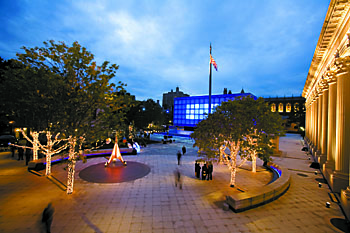 | Beinecke Plaza was aglow for a reception there. |
Yale officials, alumni and friends gathered on campus on Sept. 30 to mark the official launch of the "Yale Tomorrow" campaign with a day-long program that highlighted the University's past and current strengths and explored its goals for the 21st century.
The day featured presentations by noted faculty and alumni on topics ranging from the ways that Yale graduates have shaped the world over the centuries to the scientific and medical breakthroughs now being made in campus laboratories; a multi-media presentation in Sprague Hall narrated by actor Sam Waterston '62 B.A.; a reception on Beinecke Plaza; and a dinner for several hundred guests.
Pointing to the "revolution in communications technology [that] has brought the world closer together, heightening the potential for cultural conflict even as national economies become more interdependent," Levin noted that, "Never before in human history has it been so important to understand one another. And here Yale is leading the way, demonstrating to our peers that universities are capable of building bridges of mutual understanding more durable than governments could ever build. Ensuring that all Yale students have an overseas experience during their time here is not only an investment in their futures, it is an investment in the future harmony of the planet."
Levin also noted that, "Yale's contribution to the future of the planet goes beyond the education of its leaders. From the life sciences to nanotechnology to the study of the environment, today's Yale has the capacity to make discoveries that will enhance dramatically the quality of human life. We must invest heavily in science, medicine and engineering to ensure that Yale remains at the forefront.
"At the same time," he continued, "we must ensure that the global citizens we educate -- especially the large majority who don't pursue careers in science, engineering or medicine -- develop a rigorous understanding of science and its role in society."
Noting that "Yale is fortunate to have within its midst four superlative schools of fine arts and two world-class art museums," Levin told the audience, "Our schools of art, architecture, music and drama not only help to define the standards of their respective crafts, they and our great museums enrich the campus for all of us -- so that students in law, management, divinity, forestry, medicine, nursing, the graduate school and the college can deepen and broaden their education through attendance at exhibitions and performances.
"We need to invest in these fine but traditionally under-supported schools to ensure their continued leadership," he added. "And we need to expand the role played by the arts in the curriculum of Yale College."
Emphasizing that "this is a comprehensive, university-wide campaign," Levin said Yale would seek support in areas ranging from "graduate education to our superlative libraries to scholarship in the social sciences and humanities, from athletics to the Peabody Museum to the environmental science and policy that is so crucial to our collective future. And, in all our schools, we want to make a Yale education accessible to the most talented and affordable for all."
The day began with a program of 24 talks and tours showcasing the scholarship and research being done by its faculty and alumni, as well as the strength of its collections.
Renowned historian David McCullough '55 B.A. presented the keynote address before a large crowd on Old Campus. His talk, titled "The Love of Learning," focused on three notable individuals who played an important role in the history of both the nation and Yale: scholar and pastor Ezra Stiles (Class of 1746), a dedicated supporter of the American Revolution, who encouraged the study of science during his tenure as president of Yale 1778-1795; patriot artist John Trumbull, who documented the Revolutionary War in his paintings and later donated them to Yale, establishing the University's first art gallery; and Manasseh Cutler (Class of 1765), who helped establish the Northwest territories and made them slave-free in the late 1700s.
* "Philip Johnson: Art and Irony," a talk by Vincent J. Scully Jr. '40 B.A., '49 Ph.D., Sterling Professor Emeritus of the History of Art, looking at the important contributions of the critic-turned-architect who taught at the School of Architecture and designed Yale's Kline science buildings, among other campus structures.
* "The Future of American Foreign Policy," offering various perspectives on the nation's international relations by Ernesto Zedillo '76 B.A., '81 Ph.D., former president of Mexico and director of the Yale Center for the Study of Globalization; John L. Gaddis, the Robert A. Lovett Professor of Military and Naval History and chair of the International Affairs Council; and Ian Shapiro '83 Ph.D., '87 J.D., Sterling Professor of Political Science and the Henry R. Luce Director of the Whitney and Betty MacMillan Center for International and Area Studies at Yale.
* "The Corporate Board's Expanding Responsibilities After Enron," on the challenges facing big business today, featuring School of Management faculty Ira M. Millstein, senior associate dean for corporate governance and performance; Jeffrey A. Sonnenfeld, senior associate dean for executive programs; and Jonathan G. Koppel, associate professor of politics, policy and organization.
* "Diving Below the Wreck: Defining, Promoting and Teaching the Humanities at Yale," in which Marie Borroff, Sterling Professor Emeritus of English and Yale's first tenured woman in the Faculty of Arts and Sciences, discussed the importance of exploring the depths and expanses of creativity and understanding.
* "Women's Health Research at Yale: Deriving Practical Benefits in Health Outcomes," a talk by Carolyn M. Mazure, professor of psychiatry and psychology and director of the Women's Health Initiative, on the need for more studies specifically on women's health issues.
* "Global Change, Extinctions and the New Age of Discovery," on the important research being done on biodiversity in light of global climate change, by Michael Donoghue, the G. Evelyn Hutchinson Professor of Ecology and Evolutionary Biology and director of Yale's Peabody Museum of Natural History; Richard O. Prum, the William Robertson Coe Professor of Ornithology, Ecology and Evolutionary Biology and head curator of vertebrate zoology at the Peabody Museum; and Lisa Curran, professor of tropical ecology and director of the Tropical Resources Institute at the School of Forestry & Environmental Studies, who recently received a $500,000 MacArthur Foundation "genius" grant.
* "Flies, Mice and Human Diseases," in which Tian Xiu '90 Ph.D., vice chair of the Department of Genetics at the School of Medicine and an investigator at the Howard Hughes Medical Institute, talked about the work that he and his colleagues at Fudan University in China are doing on mapping the functions of the mouse genome, research that they hope will lead to more effective diagnosis and treatment of human diseases.
In addition, Vice President for New Haven and State Affairs Bruce Alexander talked about the New Haven "renaissance"; Sterling Professor Emeritus and former Yale President Howard R. Lamar participated in a discussion about a major traveling exhibition sponsored by the Yale Art Gallery; Yale College Dean and Professor of Psychology Peter Salovey took part in a presentation on "emotional intelligence"; and School of Drama Dean James Bundy helped lead a presentation by drama students titled "To Sing Is To Act."
Also featured were Yale faculty members Chris Argyris, Ian Ayres, Tim J. Barringer, Dr. Irwin M. Braverman, Dr. Christopher K. Breuer, Thomas C. Duffy, Dr. Milissa A. McKee, Dr. R. Lawrence Moss, Barry Nalebuff, Linda H. Pellico, Caryl Phillips, W. Mark Saltzman, Dr. Bennett A. Shaywitz, Dr. Sally E. Shaywitz, Ron Van Lieu and Miroslav Volf. Other speakers included Joseph L. Cumming and Andrew D. Saperstein of the Divinity School's Center for Faith and Culture; Linda K. Friedlaender and Eleanor Hughes of the Yale Center for British Art; Helen Cooper, Laurence B. Kanter and John Marciari of the Yale University Art Gallery; and Frank Turner of the Beinecke Rare Book and Manuscript Library.
The impact of Yale on its students -- and the impact that they are, in turn, making on the world -- was the focus of the multimedia presentation held that evening in Sprague Hall.
The show began with a montage of video clips of graduating Yale students talking about their campus experiences. When Waterston, who majored in drama during his undergraduate years at Yale, stepped onto the stage, the audience applauded with delight.
The award-winning actor introduced a series of video segments highlighting the accomplishments of recently graduated Yale students. These included:
* Sean Glass '03, Miles Lasater '01 and Mark Volchek '00, founders of Higher One, a company that provides banking and financial services to students and universities, and the Yale Entrepreneurial Society, which awards seed money to support startups.
* Benita Singh '04 and Ruth Degolia '04, founders of Mercada Global, a non-profit fair-trade company that exports handmade goods from Guatamela and uses the proceeds both to compensate the craftswomen working in cooperative communities in that nation and to promote education through scholarships for underprivileged women.
* Violin virtuoso Owen Dalby, a 2006 graduate of Yale College who is now studying at the School of Music, and who has already performed throughout North America and Europe. Dalby appeared in person to play for the Sprague Hall audience following his video segment.
* Joslyn Woodard '06, who majored in molecular, cellular and developmental biology, said that, after her mother was diagnosed with multiple sclerosis, she became determined to go to medical school and work on a cure. She is currently taking a break before pursuing that ambition by working for Teach for America.
* Nate Herring '06, who grew up on a small farm in Vermont and worked for a logging camp to earn money for his education before coming to Yale on a full scholarship. Herring -- who won a Rhodes Scholarship, volunteered during his undergraduate years at a local residence for mentally disturbed youths and has authored a children's book -- also appeared in person to talk about the difference that Yale's financial aid program made in his life.
Beinecke Plaza was transformed into a literal embodiment of "Lux et Veritas" for the reception that followed the Sprague Hall presentation.
The façade of the Beinecke Rare Book and Manuscript Library was aglow with blue light, and the trees and Calder sculpture in the plaza were also illuminated, as were the columns outside University Commons and the top of the Woolsey Hall rotunda. A huge ice sculpture of a bulldog stood inside the rotunda.
At the dinner in University Commons, which also boasted special lighting for the occasion, Levin told the guests that $1.3 billion of the $3 billion goal had already been raised in the "quiet phase" of the campaign.
Noting that "great enterprise requires great leadership," Levin called onto the stage "those volunteer leaders who are helping to lead this noble effort." These included campaign co-chairs G. Leonard Baker '64 B.A., Edward P. Bass '68 B.A., Roland Betts '68 B.A., Joshua Beckenstein '80 B.A. and Susan Crown '80 B.A. The president also expressed his appreciation to outgoing Yale Alumni Fund chair, William W. Wright II '82 B.A., and to the new chair, William M. Folberth '66 B.S., as well as to Charles Ellis '59 B.A., who is spearheading the effort to raise funds for the School of Management.
Levin concluded by telling the audience members: "Through three centuries Yale's achievements have been made possible by people like those gathered here tonight -- graduates and friends whose generosity provides the resources to make continuous innovation and improvement a reality. I'm sticking with this job because I know that you will rally to the cause, that you will support Yale's grand aspirations to serve the nation and the world through the advancement of knowledge and the education of leaders. This is our calling. Together we will shape a Yale even greater than the Yale of today. Together we will build Yale Tomorrow."
T H I S
Campaign formally launched
at 'Yale Tomorrow' celebration
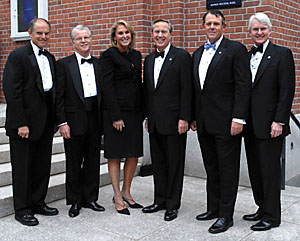
President Richard C. Levin is pictured with the co-chairs of the "Yale Tomorrow" campaign (from left) Joshua Beckenstein '80 B.A., G. Leonard Baker '64 B.A., Susan Crown '80 B.A., Roland Betts '68 B.A. and Edward P. Bass '68 B.A.
At the dinner, President Richard C. Levin told those assembled that the campaign would seek to raise $3 billion over the next five years to support initiatives that would transform "the Yale that was once a tiny college for the Connecticut colony into a truly global institution, serving not only America but the world."
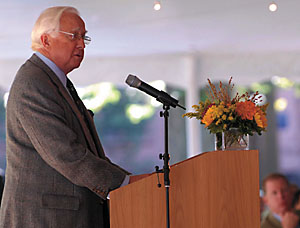
Renowned historian David McCullough talked about how three alumni from the 1700s exemplified "The Love of Learning."
Faculty and alumni talks
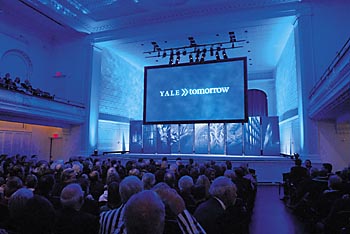
The day included a multimedia show in Sprague Hall.
Multimedia presentation
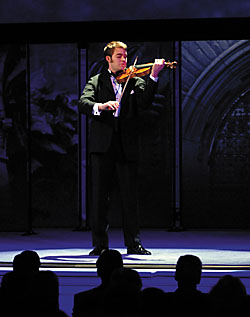
School of Music student and recent Yale College graduate Owen Dalby, one of the students highlighted in the Sprague Hall presentation, performed for the audience.
Reception and dinner
 W E E K ' S
W E E K ' S S T O R I E S
S T O R I E S![]()
 University launches 'Yale Tomorrow' campaign
University launches 'Yale Tomorrow' campaign![]()
![]()
 Gift of $50 million to create Greenberg Yale-China Initiative
Gift of $50 million to create Greenberg Yale-China Initiative![]()
![]()
 Greenberg: 'Flexibility' will be key Yale asset in China
Greenberg: 'Flexibility' will be key Yale asset in China![]()
![]()
 Program will educate corporate leaders about . . . climate change
Program will educate corporate leaders about . . . climate change![]()
![]()
 V.P. and union president co-chairing Yale-United Way Campaign
V.P. and union president co-chairing Yale-United Way Campaign![]()
![]()
 This year's 'Science Saturdays' for children celebrates women scientists
This year's 'Science Saturdays' for children celebrates women scientists![]()
![]()
 Alumnus Robert Burger is named an assistant provost
Alumnus Robert Burger is named an assistant provost![]()
![]()
 MEDICAL CENTER NEWS
MEDICAL CENTER NEWS
 Yale receives $7.2 million grant for cardiovascular imaging
Yale receives $7.2 million grant for cardiovascular imaging![]()
 Team finds promising treatment for hookworm
Team finds promising treatment for hookworm![]()
 Training program may help control behavior of children with TS
Training program may help control behavior of children with TS![]()
 Study: Vets often sicker than civilians with same illness
Study: Vets often sicker than civilians with same illness![]()
 Genetics may play a role in premature infants' lung problems . . .
Genetics may play a role in premature infants' lung problems . . .![]()
 Keck Foundation honors endocrinologist for insulin research
Keck Foundation honors endocrinologist for insulin research![]()
![]()
 More Yale-related MacArthur Fellows
More Yale-related MacArthur Fellows![]()
![]()
 Yale's Endowment earns 22.9% in the past fiscal year
Yale's Endowment earns 22.9% in the past fiscal year![]()
![]()
 Erin Lavik and Tarek Fahmy win biomedical engineering awards
Erin Lavik and Tarek Fahmy win biomedical engineering awards![]()
![]()
 Are we alone? 'Alien Earths' explores scientists' quest to find out
Are we alone? 'Alien Earths' explores scientists' quest to find out![]()
![]()
 Exhibit explores connections between art and music in different period
Exhibit explores connections between art and music in different period![]()
![]()
 Yale novelists, poets and playwrights will read from their works
Yale novelists, poets and playwrights will read from their works![]()
![]()
 Works by photojournalists in Iraq on view at ISM
Works by photojournalists in Iraq on view at ISM![]()
![]()
 Study finds affirmation exercise boosts minority . . .
Study finds affirmation exercise boosts minority . . .![]()
![]()
 Conference to explore ways to increase diversity in higher education
Conference to explore ways to increase diversity in higher education![]()
![]()
 Traveling Margaret Mead Film & Video Festival comes to campus
Traveling Margaret Mead Film & Video Festival comes to campus![]()
![]()
 Ancient coins will be showcased in 'The Romans in Asia' symposium
Ancient coins will be showcased in 'The Romans in Asia' symposium![]()
![]()
 Two noted scientists serving as visiting scholars . . .
Two noted scientists serving as visiting scholars . . .![]()
![]()
 Five alumni to be honored with Wilbur Lucius Cross Medals
Five alumni to be honored with Wilbur Lucius Cross Medals![]()
![]()
 Five junior faculty members are honored by The MacMillan Center . . .
Five junior faculty members are honored by The MacMillan Center . . .![]()
![]()
 Memorial service for Jaroslav Pelikan
Memorial service for Jaroslav Pelikan![]()
![]()
 University of Michigan professor wins Yale's Douglass Prize
University of Michigan professor wins Yale's Douglass Prize![]()
![]()
 Campus Notes
Campus Notes![]()
Bulletin Home |
| Visiting on Campus
Visiting on Campus |
| Calendar of Events
Calendar of Events |
| In the News
In the News![]()
Bulletin Board |
| Classified Ads
Classified Ads |
| Search Archives
Search Archives |
| Deadlines
Deadlines![]()
Bulletin Staff |
| Public Affairs
Public Affairs |
| News Releases
News Releases |
| E-Mail Us
E-Mail Us |
| Yale Home
Yale Home